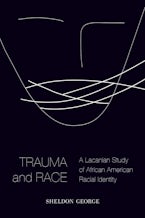Trauma and Race presents a compelling and original approach to race that confronts head-on the seemingly intractable attachment of identity to race in America. Through fresh and innovative readings, Sheldon George shows how classic African American texts like Morrison’s Beloved and Ellison’s Invisible Man can suggest new and revitalizing sources for African American identities. With admirable clarity and persuasive force, George uses Lacanian psychoanalytic concepts to offer a new perspective on race that will surely excite debate and reorient discussions about race in America.
~Jean Wyatt, author of Risking Difference: Identification, Race and Community in Contemporary Fiction and Feminism
With well-grounded roots in Lacanian psychoanalytic theory, Sheldon George reveals the real trauma of slavery in the United States. This is a masterly work of analysis that makes an important contribution to the emerging discussion around slavery and trauma.
~Ron Eyerman, Professor of Sociology, Yale University
The most important book on psychoanalysis and race in the twenty-first century, Sheldon George’s Trauma and Race makes the crucial argument that only a Lacanian theory of enjoyment, or jouissance, can help us understand the excesses of racist bigotry and violence.
~Clint Burnham, Professor of English, Simon Fraser University and co-editor of Lacan and the Environment
Trauma and Race has changed the landscape of thinking about racism. By understanding the psychic dynamics underlying racist structures, Sheldon George has propelled the analysis of racism into uncharted territory. All of a sudden, factors in racism that were formerly obscure become perfectly clear, and the most senseless acts of racist violence become comprehensible in terms of the psychic forces driving them. It's an epochal book that no thinking person can afford to ignore.
~Todd McGowan, author of Capitalism and Desire
Trauma and Race offers a ground-breaking intervention into how the fantasy of race consolidates racist logic. George issues an urgent and eloquent proposition for how embracing race’s structuring negativity not only impedes the hold of racist structures but also unlocks a potential space of freedom for the subject.
~Jennifer Friedlander, Edgar E. and Elizabeth S. Pankey Professor of Media Studies, Pomona College and author of Real Deceptions: The Contemporary Reinvention of Realism
A study of enormous analytical subtlety and precision. Trauma and Race is a pioneering text which has deservedly risen to the very forefront of scholarly work attempting to think racial identity--and the traumatic American history of slavery informing contemporary associated formations of race--psychoanalytically. Rarely have Lacanian psychoanalysis, African-American Studies, and the exploration of American literature (particularly that of Toni Morrison, Ralph Ellison, and W.E.B Du Bois) been so deftly and expertly interwoven. Simply put: one cannot enter debates on race, racism and Lacanian theory without citing this landmark contribution.
~Derek Hook, Associate Professor, Duquesne University and author of Six Moments in Lacan
Sheldon George has written a book of readable Lacanian complexity, a text that can be read as an elegant illustration of Lacanian theory. At the same time, the book illuminates the enormous complexity of living, being, thinking, speaking and existing with others in race.
~Angie Voela, Psychoanalysis, Culture & Society
Sheldon George has done valuable work that lays a foundation for psychoanalysts to theorize racial injustice and to assist in constructing a counternarrative that can contribute to pushing back against the resurgence of White supremacy as a master signifier in the United States today. It is urgent work to which psychoanalysts should be prepared to contribute.
~Michael O'Loughlin, Psychoanalytic Psychology

